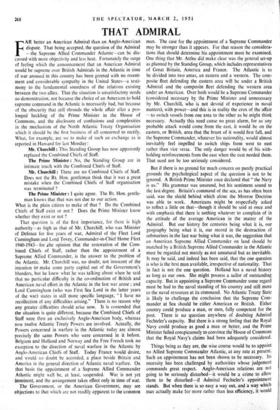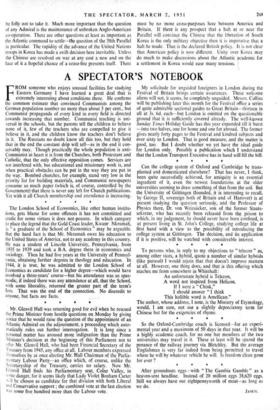THAT ADMIRAL
FAR better an American Admiral than an Anglo-American dispute. That being accepted, the question of the Admiral —the Supreme Allied Commander Atlantic—can be dis- cussed with more objectivity and less heat. Fortunately the surge of feeling which the announcement that an American Admiral would be supreme over British Admirals in the Atlantic in time of war aroused in this country has been greeted with no resent- ment and considerable sympathy in the United States—a testi- mony to the fundamental soundness of the relations existing between the two allies. That the situation is unsatisfactory needs no demonstration, not because the choice of an American to hold supreme command in the Atlantic is necessarily bad, but because of the obscurity that still shrouds the whole affair after a pro- longed heckling of the Prime Minister in the House of Commons, and the disclosure of confusions and complexities in the mechanism of the North Atlantic Treaty Organisation which it should be the first business of all concerned to rectify. What, for example, are we to make of such an exchange as is reported in Hansard for last Monday: Mr. Churchill : This Standing Group has now apparently replaced the Combined Chiefs of Staff.
The Prime Minister : No, the Standing Group are in intimate touch with the Combined Chiefs of Staff.
Mr. Churchill : There are no Combined Chiefs of Staff. Does not the Rt. Hon. gentleman think that it was a great mistake when the Combined Chiefs of Staff organisation was terminated ?
The Prime Minister : I quite agree. The Rt. Hon. gentle- man knows that that was not due to our action.
What is the plain citizen to make of that ? Do the Combined Chiefs of Staff exist or not ? Does the Prime Minister know whether they exist or not ?
That question is of the first importance, for there is high authority—as high as that of Mr. Churchill. who was Minister of Defence for five years of war, Admiral of the Fleet Lord Cunningham and Lord Tovey, Commander-in-Chief Home Fleet 1940-1943—for .the opinion that the restoration of the Com- bined Chiefs of Staff, rather than the appointment of a Supreme Allied Commander, is the answer to the problem of the Atlantic. Mr. Churchill was, no doubt, not innocent of the intention to make some party capital out of the Government's blunders, but he knew what he was talking about when he said that no particular difficulty in the co-ordination of British and American naval effort in the Atlantic in the last war arose : and Lord Cunningham (who was First Sea Lord in the latter years of the war) states in still more specific language. " I have no recollection of any difficulties arising." There is no reason why any greater difficulties should arise now. It is contended that the situation is quite different, because the Combined Chiefs of Staff were then an exclusively Anglo-American body, whereas now twelve Atlantic Treaty Powers are involved. Actually, the Powers concerned in warfare in the Atlantic today are almost precisely the same Powers who were concerned in it before. Belgium and Holland and Norway and the Free French took no exception to the direction of naval warfare in the Atlantic by Anglo-American Chiefs of Staff. Today France Would' desire, and would no doubt be accorded, a place beside Britain and America in the general direction of Atlantic naval warfare. On that basis the appointment of a Supreme Allied Commander Atlantic might well be, at least, suspended. War is not yet imminent, and the arrangement takes effect only in time of war.
The Government, or the American Government, may see objections to that which are not readily apparent to the`common man. The case for the appointment of a Supreme Commander may be stronger than it appears. For that reason the considera- tions that should determine his appointment must be examined. One thing that Mr. Attlee did make clear was the general set-up as planned by the Standing Group, which includes representatives of Great Britain, America and France. The Atlantic is to be divided into two areas, an eastern and a western. The com- posite fleet defending the eastern area will be under a British Admiral and the composite fleet defending the western area under an American. Over both would be a Supreme Commander (considered necessary by the Prime Minister and unnecessary by Mr. Churchill, who is not devoid of experience in naval matters), with power—and this is in reality the crux of the affair —to switch vessels from one area to the other as he might think necessary. Actually this need cause no great alarm, for as any probable attack would come from the east, it would be on the eastern. or British, area that the brunt of it would first fall, and the Supreme Commander, whatever his nationality, would almost inevitably feel impelled to switch ships from west to east rather than vice versa. The only danger would be of his with- holding reinforcements from the east when the east needed them. That need not be too seriously considered.
But if there is no ground for much concern on purely practical grounds the psychological aspect of the question is not to be ignored. A British Prime Minister once declared that " the Navy is us." His grammar was unsound, but his sentiment sound to the last degree. Britain's command of the sea, as has often been said, was the shield behind which alone the Monroe Doctrine was able to work. Americans might be respectfully asked to reflect a little on that—though it should be said at once and with emphasis that there is nothing whatever to complain of in the attitude of the average' American in the matter of the Admiral. But our history for centuries being what it is, our geography being what it is, our record in the destruction of submarines in the last war being what it was, the suggestion that an American Supreme Allied Commander on land should be matched by a British Supreme Allied Commander in the Atlantic must be regarded not merely as not unnatural but as inevitable. It may be said, and indeed has been said, that the one question is who is the best man available, irrespective of nationality. That in fact is not the one question. Holland has a naval history as long as our own. She might possess a sailot of outstanding capacity. But in appointing a Supreme Commander some regard must be had to the naval standing of his country and still more to the naval resources at its command. No Atlantic Treaty State is likely to challenge the conclusion that the Supreme Com- mander at Sea should be either American or British. Either country could produce a man, or men, fully competent for the post. There is no question anywhere of doubting Admiral Fechteler's capacity. But there is a strong feeling that the Rural Navy could produce as good a man or better, and the Prime Minister failed conspicuously to convince the Houseof Commons that the Royal Navy's claims had been adequately considered.
Things being as they are, the wise course would be to appoint no Allied Supreme Commander Atlantic, at any rate at present. Such an appointment has not been shown to be necessary. Its necessity has been challenged by authorities whose judgement commands great respect. Anglo-American relations are not going to be seriously disturbed—it would be a crime to allow them to be disturbed—if Admiral Fechteler's appointment stands. But when there is so easy a way out, and a way which may actually make for more rather than less efficiency, it would be folly not to take it. Much more important than the question of any Admiral is the maintenance of unbroken Anglo-American co-operation. There are other questions at least as important as the Atlantic command to settle—tilt question of the 38th Parallel in particular. The rapidity of the advance of the United Nations troops in Korea has made a swift decision here inevitable. Unless the Chinese are resolved on war at any cost a new and on the face of it a hopeful chance of a cease-fire presents itself. There must be no more cross-purposes here between America and Britain. if there is any prospect that a halt at or near the Parallel will convince the Chinese that the liberation of South Korea is the only military objective then it is imperative that a halt be made. That is the declared British policy. It is not clear that American policy is now different. Unity over Korea may do much to make discussions about the Atlantic academic for a settlement in Korea would ease many tensions.



































 Previous page
Previous page